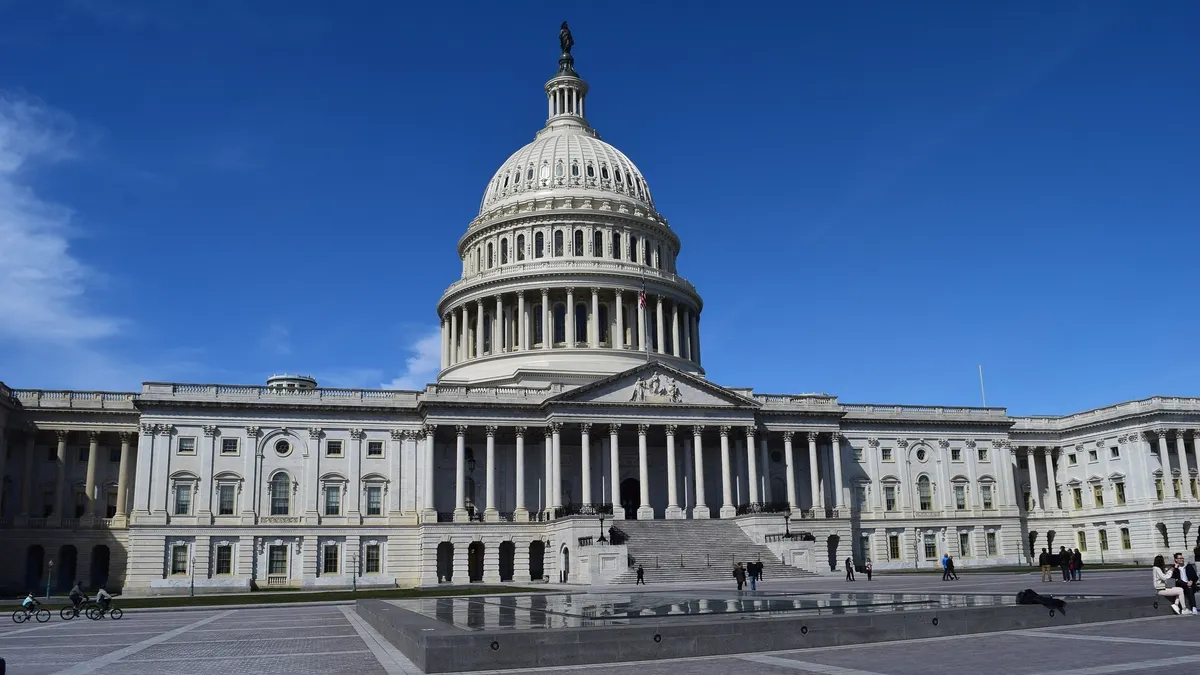Dive Brief:
- More than thirty companies spanning from Unilever to Pepsi to Edison International have signed a letter to Congress, urging the inclusion of clean energy policies in a federal COVID-19 recovery package.
- American businesses have set ambitious goals to reduce their greenhouse gas emissions, but believe greater government support is critical to the development of clean energy infrastructure, according to the letter filed last Tuesday. The installation of such infrastructure could fuel a “job creation engine” to help the nation recover from COVID-19, the companies wrote.
- Analysts say federal investment would grow renewable energy and boost job creation, but may not provide the rapid, short-term growth needed to jump start economic recovery after COVID-19.
Dive Insight:
American corporations want the post-pandemic recovery to be a green recovery, according to a July 21 letter to Congress. Renewable energy could indeed play a role in the recovery from COVID-19, analysts say, but the details of the plan will determine its success.
The letter is signed by 32 companies, mostly in the food, technology and apparel industries, and it does suggest some details. It asks that any COVID-19 stimulus package include provisions to modernize the grid and incentivize electrification and energy efficiency. It also requests a delay in the phaseout of the production tax credit and investment tax credit for renewable energy investments, and create direct pay options under both those programs to address industry concerns about liquidity.
“We are large consumers of energy and, while navigating and addressing the complex business impacts of Coronavirus Disease of 2019 (COVID-19), we all agree that we cannot put on hold our efforts to combat climate change,” the letter reads. “We remain committed to reducing greenhouse gas emissions and using renewable energy to power our businesses is an integral part of these efforts.”
The letter also cites a research paper from the University of Massachusetts to claim that renewable energy investment creates three times more jobs than investment in fossil fuels.
Broadly speaking, there is ample evidence to suggest that public capital would be an effective way to stimulate growth and even private investment in renewable energy, according to Jurgen Weiss, a principal at The Brattle Group and a senior lecturer in the Business, Government and International Economy unit at Harvard Business School. This is especially true if those dollars go toward initiatives that remain too high-risk for private investors, such as long-term storage, he said.
But while investment to "accelerate decarbonization in the U.S." is needed and "a generally good idea," Weiss said, politicians and corporate leaders need to look at quickly infusing much larger sums of money than suggested in previous proposals that have considered these details.
The proposal from corporations "requires thinking hard about what portion of the investment would lead to relatively short-term activity. Because if it takes three to four years for the shovels to be sunk into the ground, then it would be less effective as a COVID recovery strategy," he said.
Peter Fox-Penner, a professor at Boston University and Chief Strategy Officer at Energy Impact Partners, also questioned the letter's assertion that specific inclusion in any COVID-19 relief package is necessary to “ensure the continued viability and growth of the renewable energy sector.” But that doesn't mean it's a bad idea, he said.
“It's not so much that clean energy needs a stimulus package,” Fox-Penner said. “I think we need a giant, short[-term], and more important long-term, recovery package, and clean energy is integral to that.”
Ensuring renewable energy is included in long-term recovery plans will enable clean energy to advance more rapidly in the U.S. while also guaranteeing a stronger economic comeback and averting what Fox-Penner said some are calling “the next mega-pandemic” that is climate change.
While such calls may have once amounted to little more than publicity points, Fox-Penner said he believes the corporations' intent in signing this letter is genuine. American businesses have passed an “inflection point” and now see clean energy as critical to their long-term financial success.
“I think the industry recognizes this is what their customers want, and that this is part of their corporate responsibility,” he said.













